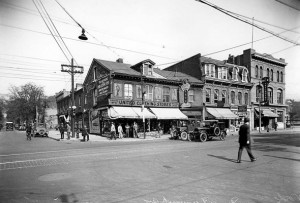- Country of Economic Contrasts
- 1st millionaires appear

- Cities have slums
- Stark contrast between the rich and the poor (upper and lower class)
- 1/4 + of babies die before their 1st birthday
- New technology makes life easier (for those who can afford the luxury)
- Technology in the Home
- 1900s was a time of “gadgets”
- New “gadgets include:
- Safety razors
- Electric irons
- Vacuum cleaners
- Push lawnmowers
- Automobiles
EFFECTS OF TECHNOLOGY
- MORE TIME OFF
- Term “weekend” is first used
- Vacations
- *Note: Many people could not afford to take time off. This, like gadgets was a luxury for the wealthy elite.
CHANGES IN FAMILY
- Middle/Lower class families need additional income to support themselves
- Wives are sent to work (aside from their regular duties – caring for the household, raising children)
- Children are forced to work (most children only achieve a grade 3 education
SLUMS
- No electricity Garbage littered streets
Little Ventilation Polluted air
Outdoor toilets Unpasturized milk
Tainted Water Supply High death rate/ disease
TYPICAL HOUSING
- Large families in small houses (1 to 2 rooms)
- Could you be a “slum dog millionaire”?
- It was very difficult to move from lower to upper class.
- Average wage was $425 / year (women and children earning much less)
- Rent = $12/month/room (basement appt.)
- Food = $13.38 / month (little meat, few vegetables)
Changes in the Workplace
- Mass Production
- Service Sector
- Rural Depopulation
- Mass Production
- Workers specialize in one area (able to make things faster) as opposed to creating entire product
- Introduction of the assembly line
- Assembly Lines and the Model T
- Service Sector
- Creation of jobs in the service sector (people who “serve” others)
- Taxi Drivers
- Mailman
- Railroad
- Bank Teller
- Accountant
- Sales Person
- Cleaner
- Clerical work
increases
-invention of
telephone & typewriter - Many clerical jobs are given to women as the economy expands
- -women are better at detail
- -women have nimble hands making it easier for them to use the machines
- Rural Depopulation
- As farms become more and more mechanized, there
- are less jobs in rural areas (less farm hands and farmers are needed)
- Fewer people live are living in rural areas
- Young people head toward the “city” in hopes for a better future
- Women (unable to own/inherit land, are often not paid for farm work) in need of supporting themselves must move to the city for employment
- Working Conditions
- Working Conditions
- Hard labour / long hours/ low pay
- 10-12 hours a day, 6 days a week
- Companies hire women & children because they can pay them much less than men
FACTORY WORK
- Poor lighting, ventilation, noisy, dirty, dangerous (from the machines)
- Poor work conditions saves the companies $
- No safety regulations
- workers forced to retire because of poor health that was a direct result from the work environment
- Job security is non-existant and unemployment is common
- Little to no compensation for work place related injuries (or deaths)
- The physically disabled are deemed unemployable (will not be able to find jobs)
- Unstable Job Market
- Jobs are not stable
- Seasonal jobs = job shortages
- More people than jobs
- Good for employers
- Large work force
- Easily threaten employees
- Low wages
- Fire people easily
- Large inflow of immigrants
- Able to pay even lower wages
- Constant labour force
- Use immigrants as strike breakers
- Reform Movements
- Social Gospel
- Urban Reform
- Education Reform
- Struggle for Equality
- Labour Movement
- Social Gospel
- Since the government does not do anything to remedy common problems (exploitation of workers, poverty, crime, disease) private charities help the poor/sick and social reformers leap into action
- Religious revival
- Believe that it is everyone’s duty to help the less fortunate
CHURCH GROUPS:
- Women’s Christian Temperance Union
- Young Men’s Christian Association
- Salvation Army
- Urban Reform
- Poor city planning is becoming a problem
- Need to improve living conditions
- Creation of Public Works
- Building of infastructure
- Sewers, gas lines, water lines
- Telephone / Electrical wires
- Public Transit
- Children’s Aid Society
- Education
- Begin to provide free schooling
- Begin educating labourers in work camps far from cities (1899 – Frontier College on Georgian Bay, ON) provides workers with basic literacy skills through evening classes
- Education is viewed as a means to “Canadianize” immigrants through assimilation (& teaching them “Canadian” customs)
- Movements to educate rural women
- Women’s Institute
- Fights for legislation regarding education, cleanliness and nutrition
- The Struggle for Equality:
The Women’s Movement - Campaign for women’s sufferage (right to vote)
- Launched by the Toronto Women’s Literary Club
- Run by Emily Stowe
- Denied access into university in Canada
- Became a Doctor in the United States
- Denied entry into the College of Physicians and Surgeons

Okay this isn’t clear!!
right it needs to explain 1/4 babies died before the 1st birthday…..WHY!!!!
need information on farm life in the 1900-1920
noooo help at all 🙁